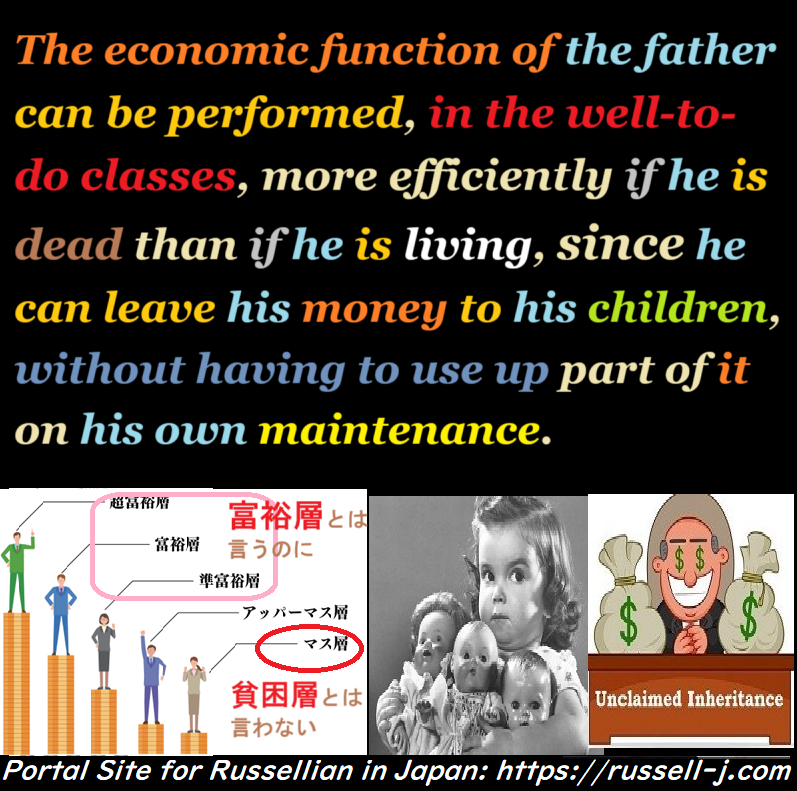
The economic function of the father can be performed, in the well-to-do classes, more efficiently if he is dead than if he is living, since he can leave his money to his children, without having to use up part of it on his own maintenance.
Source: Bertrand Russell: Marriage and Morals, 1929
More info.:https://russell-j.com/beginner/MM09-090.HTM
* a brief comment:
Unless one adopts a fatalistic view, it cannot be said that whether one is born into a poor family or a wealthy one was determined before birth. However, once we are born into this world, don't we often feel as if the environment and circumstances into which we were born were somehow destined?
A child fortunate enough to be born into a wealthy family comes to take a comfortable life for granted and naturally acquires the sensitivities and ways of thinking appropriate to such a life. Of course, if the parents provide proper upbringing, the child will not develop an attitude of looking down on poorer children. Yet if the parents themselves harbor such prejudices, the child will easily absorb the same attitudes. Thus, when we see a young person behaving arrogantly, we are tempted to say, "I'd like to see what their parents are like."
Reading today's words of Russell - "The economic function of the father can be performed, in the well-to-do classes, more efficiently if he is dead than if he is living" - what thoughts come to mind?
A child born into a poor family is inevitably forced to develop habits of frugal living, and if the parents die young, life becomes even harsher. On the other hand, a child born into a wealthy household -- here specifically referring to an affluent class -- does not suffer economic hardship even after the parents' death; rather, the child gains greater freedom in using the parents' assets.
Of course, "poverty" and "wealth" are both relative concepts. Nonetheless, should we not regard a society in which the majority are indifferent to the plight of those struggling with daily life as a degraded society?
* Amazon Gift Card
Source: Bertrand Russell: Marriage and Morals, 1929
More info.:https://russell-j.com/beginner/MM09-090.HTM
* a brief comment:
Unless one adopts a fatalistic view, it cannot be said that whether one is born into a poor family or a wealthy one was determined before birth. However, once we are born into this world, don't we often feel as if the environment and circumstances into which we were born were somehow destined?
A child fortunate enough to be born into a wealthy family comes to take a comfortable life for granted and naturally acquires the sensitivities and ways of thinking appropriate to such a life. Of course, if the parents provide proper upbringing, the child will not develop an attitude of looking down on poorer children. Yet if the parents themselves harbor such prejudices, the child will easily absorb the same attitudes. Thus, when we see a young person behaving arrogantly, we are tempted to say, "I'd like to see what their parents are like."
Reading today's words of Russell - "The economic function of the father can be performed, in the well-to-do classes, more efficiently if he is dead than if he is living" - what thoughts come to mind?
A child born into a poor family is inevitably forced to develop habits of frugal living, and if the parents die young, life becomes even harsher. On the other hand, a child born into a wealthy household -- here specifically referring to an affluent class -- does not suffer economic hardship even after the parents' death; rather, the child gains greater freedom in using the parents' assets.
Of course, "poverty" and "wealth" are both relative concepts. Nonetheless, should we not regard a society in which the majority are indifferent to the plight of those struggling with daily life as a degraded society?
* Amazon Gift Card
